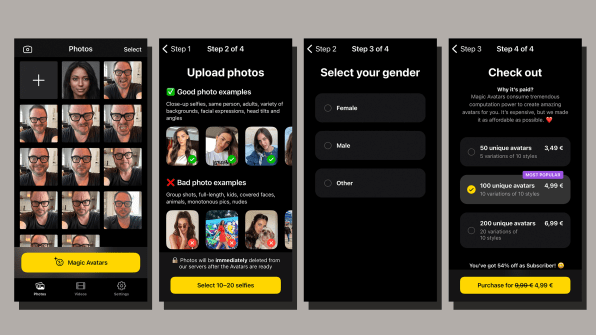Where is everyone getting those AI avatars? How Lensa took over the internet
Since launching in 2018, the app Lensa has been buried in a heap of photo-editing programs available in the iOS App store. It was one of those apps that spams you with promises of the kinds of perfectly beautified mug shots that are 100% guaranteed to disappoint Tinder dates later on. Now, at least judging by the infinite stream of images tagged #lensa, it feels like it’s the most popular app in the galaxy. The reason, I believe, is that it serves as an extraordinary vehicle for self-expression. People are curating and posting idealized versions of themselves, showcasing their inner desires to others like never before.
Like many of the truly wonderful (and terrible) things on the internet today, Lensa’s rise through the app ranks happened, thanks to generative artificial intelligence, the neural network magic that conjures images out of thin air if you cast the right spell. This time, however, there’s no need to install anything, no need to go to Discord, or learn how to build a perfect ‘prompt’ that will instruct the AI how to translate the picture trapped in your brain into something viewable on a computer screen.
It only requires you to click one big yellow button. It’s an extremely easy user experience, one that lowers the bar for playing with AI-generated images to anyone with an iPhone (it is not available on Android yet).

After clicking the yellow button, Lensa will ask you to select 10 to 20 images that clearly show your face. Then it will ask you to pick your gender—male, female, other—and, after paying $3.50 and waiting about 20 minutes, you will get 50 versions of yourself rendered in different styles and poses in 4K resolution. The results are impressive. Very impressive.
Some of those results are imperfect, with a few glitches here and there. But the precision, finesse, and sophistication distilled into many of these portrait illustrations makes them seem like the product of a cadre of hyper-fast professional artists who, in minutes, create images for anyone wanting to star in their very own movie. And, in a way, that’s exactly what’s happening: Lensa’s new “Magic Avatars” feature uses the Stable Diffusion (SD) engine and a model that appears to have been trained in the works of thousands of artists. While the AI itself doesn’t use the artists’ actual images, they serve as the “guide” to turn Gaussian noise into completely new digital drawings and paintings.
In the case of Lensa, the AI also trains on your selfies in the cloud (buyers beware, even though the app claims it will delete your photos after using them). The result is that Lensa’s pictures are very close to your physique, stylized to match various styles like “Anime,” “Cosmic,” or “Fairy Princess.” The styles make it obvious that the model has been trained in manga, sci-fi, fantasy illustrators, and everything in between. You can detect traces of every famous artist who’s ever existed, from centuries past and the modern artists who followed them.
Lensa’s use of Stable Diffusion’s models has again brought accusations of predatory practices by the developers of these apps, who are using photos to turn a profit without paying anything to the artists; also, from people who believe the app model doesn’t represent them well enough and those who believe it’s sexist.
The true us
Overall though, almost everyone using Lensa is taken with the new avatar feature. Instagram and Twitter’s Lensa hashtag pages are currently a never-ending mosaic of portraits of all kinds in which all races, genres, sexual orientations, and aspirations seem to be represented. Scrolling down these rabbit holes feels like an exhilarating door into the internet’s mind—a portal to how varied and weird and wonderful we all are. It’s beautiful to see. Also, fascinating.
Lensa can give you as many “yous” to choose from as you want, as long as you pay for them. Then you can pick the version(s) that you think represents you the best, for whatever reason, conscious or subconscious. Probably both. Cherry-picking how we want to present ourselves online is not a new act. But with these portraits, we are giving everyone something more intimate: the aspirational version of ourselves. Not to shove too much meaning onto a simple app, but the act of curating these alternative versions of your being is as true a statement about how you want to be perceived as anything else.
If reading anonymous prompts in Lexica.art—the search engine that allows you to see what people ask Stable Diffusion to render—felt like getting into someone’s apartment and looking through their books and drawers, this is the equivalent of crawling out onto your building’s fire escape and screaming, “This is how I really want to see myself and how I want you to see me!”
Giving the AI the power to represent us in random ways has empowered everyone to pick the right version of themselves for everyone to see. Or, at least, the version that feels right to them. It’s weird. Here I was thinking AI may take our humanity away—and maybe it will, at one point—but, as it turns out, it’s surfacing what makes us all human, too.
(25)

